01 Unit5-Unit6知识点梳理过关-2022-2023年八年级英语下期期中高频考点专练(仁爱版)(含答案)
文档属性
| 名称 | 01 Unit5-Unit6知识点梳理过关-2022-2023年八年级英语下期期中高频考点专练(仁爱版)(含答案) | 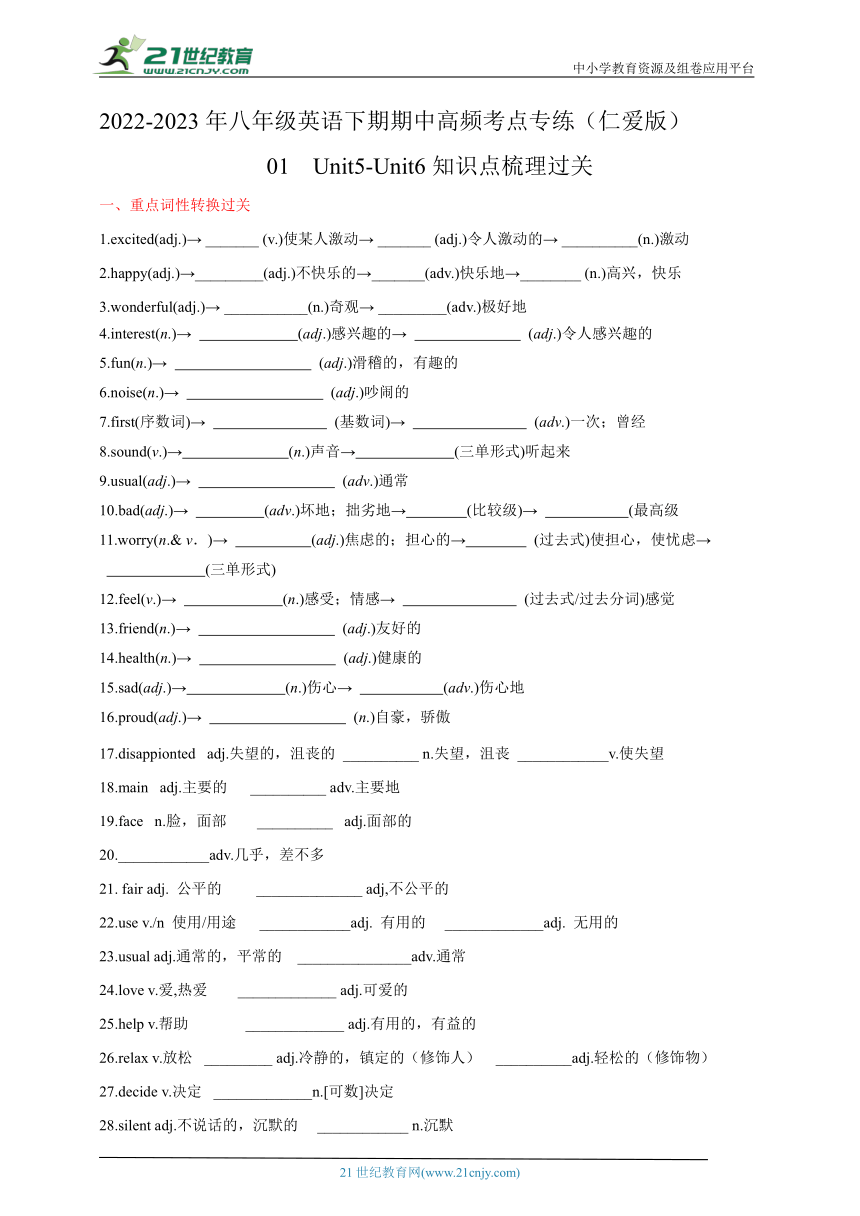 | |
| 格式 | zip | ||
| 文件大小 | 265.3KB | ||
| 资源类型 | 试卷 | ||
| 版本资源 | 仁爱科普版 | ||
| 科目 | 英语 | ||
| 更新时间 | 2023-04-02 07:15:11 | ||
图片预览

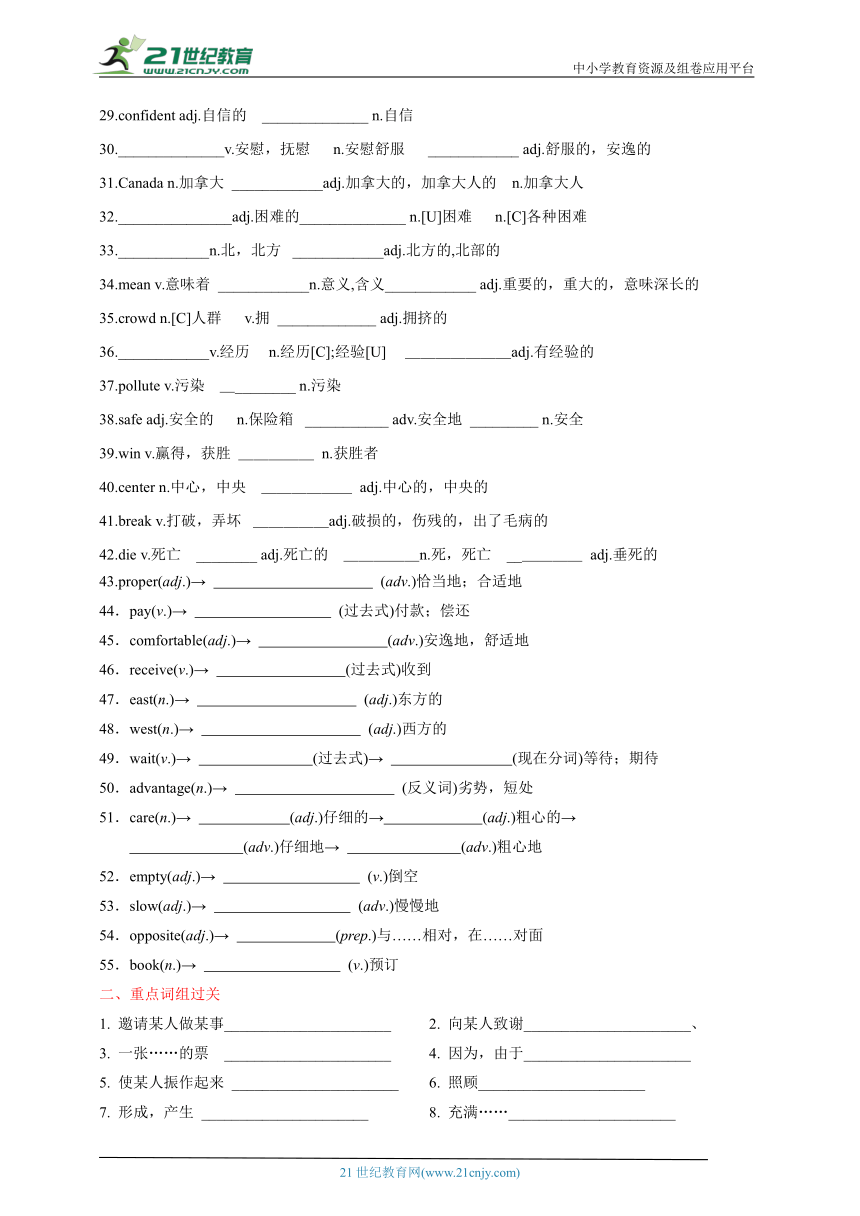
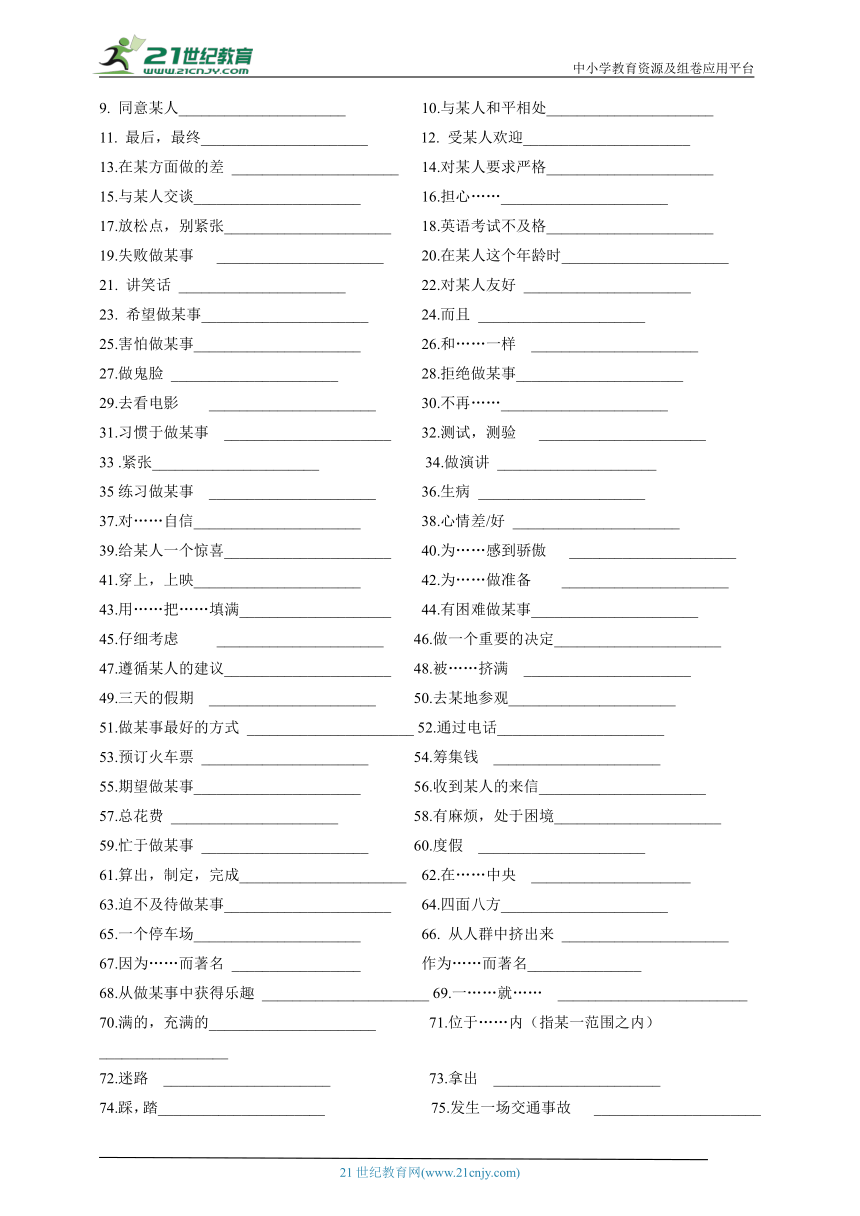
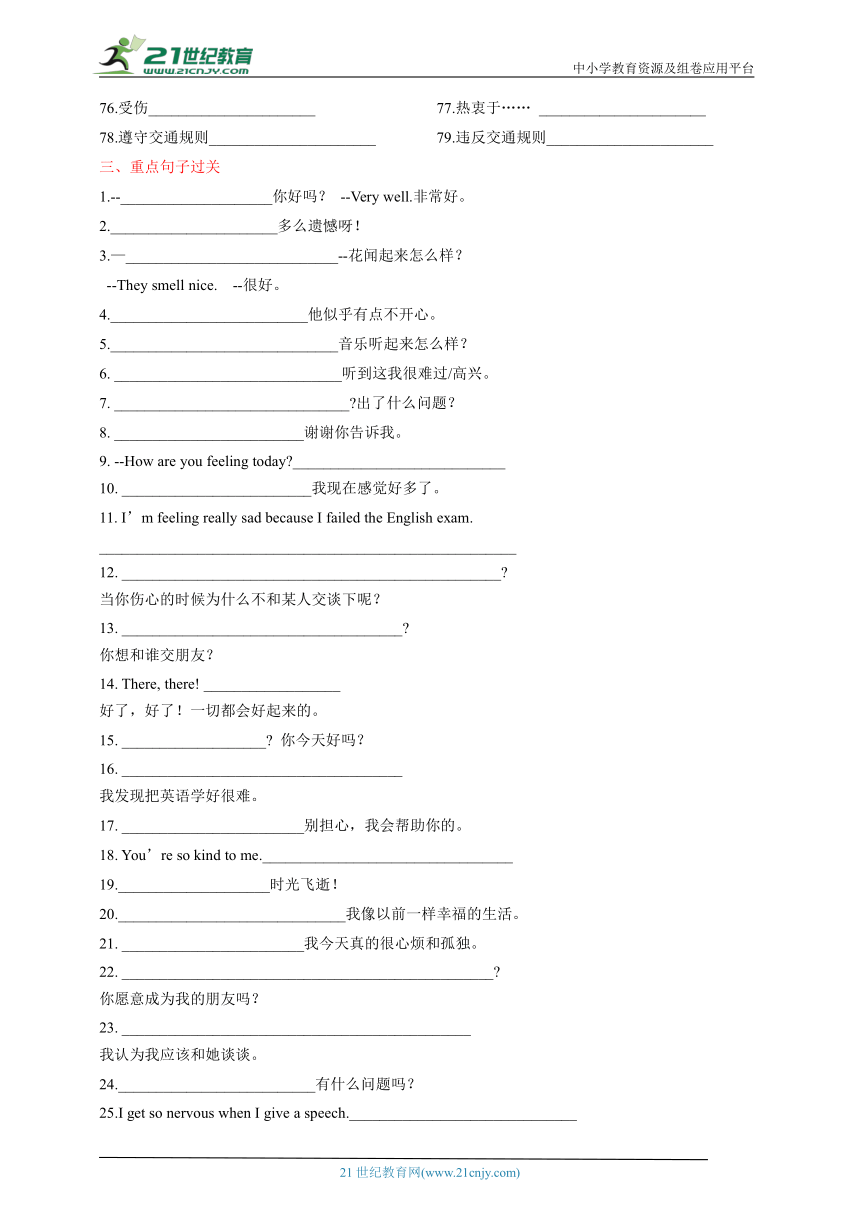
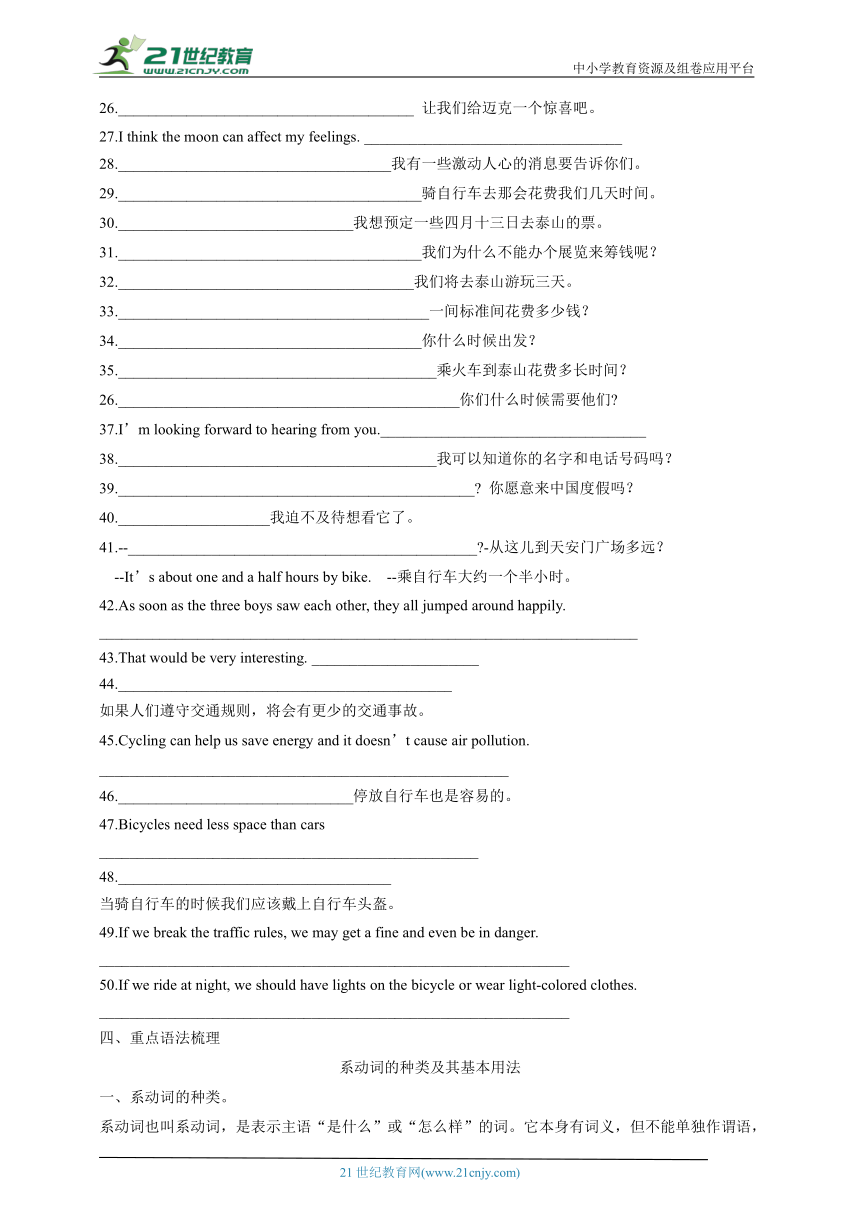
文档简介
中小学教育资源及组卷应用平台
2022-2023年八年级英语下期期中高频考点专练(仁爱版)
01 Unit5-Unit6知识点梳理过关
一、重点词性转换过关
1.excited(adj.)→ _______ (v.)使某人激动→ _______ (adj.)令人激动的→ __________(n.)激动
2.happy(adj.)→_________(adj.)不快乐的→_______(adv.)快乐地→________ (n.)高兴,快乐
3.wonderful(adj.)→ ___________(n.)奇观→ _________(adv.)极好地
4.interest(n.)→ (adj.)感兴趣的→ (adj.)令人感兴趣的
5.fun(n.)→ (adj.)滑稽的,有趣的
6.noise(n.)→ (adj.)吵闹的
7.first(序数词)→ (基数词)→ (adv.)一次;曾经
8.sound(v.)→ (n.)声音→ (三单形式)听起来
9.usual(adj.)→ (adv.)通常
10.bad(adj.)→ (adv.)坏地;拙劣地→ (比较级)→ (最高级
11.worry(n.& v.)→ (adj.)焦虑的;担心的→ (过去式)使担心,使忧虑→
(三单形式)
12.feel(v.)→ (n.)感受;情感→ (过去式/过去分词)感觉
13.friend(n.)→ (adj.)友好的
14.health(n.)→ (adj.)健康的
15.sad(adj.)→ (n.)伤心→ (adv.)伤心地
16.proud(adj.)→ (n.)自豪,骄傲
17.disappionted adj.失望的,沮丧的 __________ n.失望,沮丧 ____________v.使失望
18.main adj.主要的 __________ adv.主要地
19.face n.脸,面部 __________ adj.面部的
20.____________adv.几乎,差不多
21. fair adj. 公平的 ______________ adj,不公平的
22.use v./n 使用/用途 ____________adj. 有用的 _____________adj. 无用的
23.usual adj.通常的,平常的 _______________adv.通常
24.love v.爱,热爱 _____________ adj.可爱的
25.help v.帮助 _____________ adj.有用的,有益的
26.relax v.放松 _________ adj.冷静的,镇定的(修饰人) __________adj.轻松的(修饰物)
27.decide v.决定 _____________n.[可数]决定
28.silent adj.不说话的,沉默的 ____________ n.沉默
29.confident adj.自信的 ______________ n.自信
30.______________v.安慰,抚慰 n.安慰舒服 ____________ adj.舒服的,安逸的
31.Canada n.加拿大 ____________adj.加拿大的,加拿大人的 n.加拿大人
32._______________adj.困难的______________ n.[U]困难 n.[C]各种困难
33.____________n.北,北方 ____________adj.北方的,北部的
34.mean v.意味着 ____________n.意义,含义____________ adj.重要的,重大的,意味深长的
35.crowd n.[C]人群 v.拥 _____________ adj.拥挤的
36.____________v.经历 n.经历[C];经验[U] _______adj.有经验的
37.pollute v.污染 _________ n.污染
38.safe adj.安全的 n.保险箱 ___________ adv.安全地 _________ n.安全
39.win v.赢得,获胜 _____ n.获胜者
40.center n.中心,中央 ______ adj.中心的,中央的
41.break v.打破,弄坏 _____adj.破损的,伤残的,出了毛病的
42.die v.死亡 ________ adj.死亡的 _____n.死,死亡 ______ adj.垂死的
43.proper(adj.)→ (adv.)恰当地;合适地
44.pay(v.)→ (过去式)付款;偿还
45.comfortable(adj.)→ (adv.)安逸地,舒适地
46.receive(v.)→ (过去式)收到
47.east(n.)→ (adj.)东方的
48.west(n.)→ (adj.)西方的
49.wait(v.)→ (过去式)→ (现在分词)等待;期待
50.advantage(n.)→ (反义词)劣势,短处
51.care(n.)→ (adj.)仔细的→ (adj.)粗心的→
(adv.)仔细地→ (adv.)粗心地
52.empty(adj.)→ (v.)倒空
53.slow(adj.)→ (adv.)慢慢地
54.opposite(adj.)→ (prep.)与……相对,在……对面
55.book(n.)→ (v.)预订
二、重点词组过关
1. 邀请某人做某事______________________ 2. 向某人致谢______________________、
3. 一张……的票 ______________________ 4. 因为,由于______________________
5. 使某人振作起来 ______________________ 6. 照顾______________________
7. 形成,产生 ______________________ 8. 充满……______________________
9. 同意某人______________________ 10.与某人和平相处______________________
11. 最后,最终______________________ 12. 受某人欢迎______________________
13.在某方面做的差 ______________________ 14.对某人要求严格______________________
15.与某人交谈______________________ 16.担心……______________________
17.放松点,别紧张______________________ 18.英语考试不及格______________________
19.失败做某事 ______________________ 20.在某人这个年龄时______________________
21. 讲笑话 ______________________ 22.对某人友好 ______________________
23. 希望做某事______________________ 24.而且 ______________________
25.害怕做某事______________________ 26.和……一样 ______________________
27.做鬼脸 ______________________ 28.拒绝做某事______________________
29.去看电影 ______________________ 30.不再……______________________
31.习惯于做某事 ______________________ 32.测试,测验 ______________________
33 .紧张______________________ 34.做演讲 _____________________
35练习做某事 ______________________ 36.生病 ______________________
37.对……自信______________________ 38.心情差/好 ______________________
39.给某人一个惊喜______________________ 40.为……感到骄傲 ______________________
41.穿上,上映______________________ 42.为……做准备 ______________________
43.用……把……填满____________________ 44.有困难做某事______________________
45.仔细考虑 ______________________ 46.做一个重要的决定______________________
47.遵循某人的建议______________________ 48.被……挤满 ______________________
49.三天的假期 ______________________ 50.去某地参观______________________
51.做某事最好的方式 ______________________ 52.通过电话______________________
53.预订火车票 ______________________ 54.筹集钱 ______________________
55.期望做某事______________________ 56.收到某人的来信______________________
57.总花费 ______________________ 58.有麻烦,处于困境______________________
59.忙于做某事 ______________________ 60.度假 ______________________
61.算出,制定,完成______________________ 62.在……中央 _____________________
63.迫不及待做某事______________________ 64.四面八方______________________
65.一个停车场______________________ 66. 从人群中挤出来 ______________________
67.因为……而著名 _________________ 作为……而著名_______________
68.从做某事中获得乐趣 ______________________ 69.一……就…… _________________________
70.满的,充满的______________________ 71.位于……内(指某一范围之内)_________________
72.迷路 ______________________ 73.拿出 ______________________
74.踩,踏______________________ 75.发生一场交通事故 ______________________
76.受伤______________________ 77.热衷于…… ______________________
78.遵守交通规则______________________ 79.违反交通规则______________________
三、重点句子过关
1.--____________________你好吗? --Very well.非常好。
2.______________________多么遗憾呀!
3.—____________________________--花闻起来怎么样?
--They smell nice. --很好。
4.__________________________他似乎有点不开心。
5.______________________________音乐听起来怎么样?
6. ______________________________听到这我很难过/高兴。
7. _______________________________ 出了什么问题?
8. _________________________谢谢你告诉我。
9. --How are you feeling today ____________________________
10. _________________________我现在感觉好多了。
11. I’m feeling really sad because I failed the English exam.
_______________________________________________________
12. __________________________________________________
当你伤心的时候为什么不和某人交谈下呢?
13. _____________________________________
你想和谁交朋友?
14. There, there! __________________
好了,好了!一切都会好起来的。
15. ___________________ 你今天好吗?
16. _____________________________________
我发现把英语学好很难。
17. ________________________别担心,我会帮助你的。
18. You’re so kind to me._________________________________
19.____________________时光飞逝!
20.______________________________我像以前一样幸福的生活。
21. ________________________我今天真的很心烦和孤独。
22. _________________________________________________
你愿意成为我的朋友吗?
23. ______________________________________________
我认为我应该和她谈谈。
24.__________________________有什么问题吗?
25.I get so nervous when I give a speech.______________________________
26._______________________________________ 让我们给迈克一个惊喜吧。
27.I think the moon can affect my feelings. __________________________________
28.____________________________________我有一些激动人心的消息要告诉你们。
29.________________________________________骑自行车去那会花费我们几天时间。
30._______________________________我想预定一些四月十三日去泰山的票。
31.________________________________________我们为什么不能办个展览来筹钱呢?
32._______________________________________我们将去泰山游玩三天。
33._________________________________________一间标准间花费多少钱?
34.________________________________________你什么时候出发?
35.__________________________________________乘火车到泰山花费多长时间?
26._____________________________________________你们什么时候需要他们
37.I’m looking forward to hearing from you.___________________________________
38.__________________________________________我可以知道你的名字和电话号码吗?
39._______________________________________________ 你愿意来中国度假吗?
40.____________________我迫不及待想看它了。
41.--______________________________________________ -从这儿到天安门广场多远?
--It’s about one and a half hours by bike. --乘自行车大约一个半小时。
42.As soon as the three boys saw each other, they all jumped around happily.
_______________________________________________________________________
43.That would be very interesting. ______________________
44.____________________________________________
如果人们遵守交通规则,将会有更少的交通事故。
45.Cycling can help us save energy and it doesn’t cause air pollution.
______________________________________________________
46._______________________________停放自行车也是容易的。
47.Bicycles need less space than cars
__________________________________________________
48.____________________________________
当骑自行车的时候我们应该戴上自行车头盔。
49.If we break the traffic rules, we may get a fine and even be in danger.
______________________________________________________________
50.If we ride at night, we should have lights on the bicycle or wear light-colored clothes.
______________________________________________________________
重点语法梳理
系动词的种类及其基本用法
一、系动词的种类。
系动词也叫系动词,是表示主语“是什么”或“怎么样”的词。它本身有词义,但不能单独作谓语,后面必须跟表语,构成系表结构来说明主语的状况、性质、特征等。主要有:be, become, get, turn ,grow, look, feel, seem, sound, taste, smell, appear等。常见的系动词可分为五种。
1. 状态系动词:只有be一词。
I am used to going about alone. 我习惯于独来独往。
2. 持续系动词:表示主语继续或保持一种状况或态度,主要有keep, remain,stay, rest, lie, stand。
I hope you’ll stay healthy. 我希望你身体好。
He always kept silent at meeting. 他开会时总保持沉默。
The door remained closed. 门仍然关着。
3.表像系动词:表示“看起来好像”,主要有seem, appear, look等。
H looks tired. 他看起来很累。
He seems (to be) quite happy. 他好像很快活。
He appeared quite well. 他显得身体相当好。
4. 感官系动词:表示“……起来”,有feel (摸起来,感觉) , smell (闻起来) ,sound (听起来) , taste (尝起来,吃起来) 等。
This kind of cloth feels very soft. 这种布摸起来很软。
They looked very tired. 他们看起来很累。
It sounds a good idea. 这听起来是个好主意。
This food tastes good. 这食物尝起来不错。
5.变化系动词:表示主语变成什么样,即表示从一种状态变为另一种状态。主要有become,grow, turn, fall,get, go, come, run。
He became mad after that. 自那之后,他疯了。
She has grown thinner and thinner. 她越来越瘦了。
When she saw this, she turned red. 她看到这,脸红了。
Several people fell ill after eating unhealthy food. 几个人吃了不卫生的食物后生病了。
She went pale at the news. 听到这消息,她的脸色变得苍白。
二、系动词的基本用法。
1. 系动词后通常可接形容词作表语,一般不接副词。
他的英语似乎很好。
误:His English seems very well.
正:His English seems very good.
但是,有时系动词后也可接副词作表语,不过
这主要限于in, on, off, out, away, up, down, over, around, inside, outside等少数副词以及here, there, upstairs, downstairs等少数表示地点或方位的副词。
Mother wasn’t in last night. 母亲昨晚不在家。
The meeting was over at five.会议五点结束。
Mother is downstairs waiting for you.母亲在楼下等你。
2. 关于系动词后接不定式:
(1) 系动词 be 后根据情况可自由地接不定式作表语:
My dream is to be a scientist. 我的梦想是当一名科学家。
(2) seem, appear, get, grow, come等系动词后也可接不定式(尤其是to be)作表语:
She always seems to be sad. 她常常显得很忧伤。
She appears to have many friends. 她好像有很多朋友。
【温馨提示】
若所接不定式为to be,通常可以省略。不过,若其后接的是表语形容词,则to be 通常不宜省略。
Unit 5-topic2
(一)原因状语从句
原因状语从句表示主句所发生的原因或理由。通常由because, as, since等词引导。
e.g. Because I lost my cellphone, I didn’t call you yesterday.
因为我手机丢了,所以昨天没有给你打电话。
We chose Calvert to lead us as he said he knew the way.
我们选择让卡尔弗特带我们走,因为他说他认识路。
Since you are so young, you should be modest.
既然你这么年轻,就应该谦虚一点。
以上例子都是原因状语从句,但从从属连词方面来说,它们有区别。
1.because语气最强,用于回答why的提问,从句可放于句首,也可放句尾,想强调什么,就把什么放在句。
e.g. He didn’t come to school because he was ill.他没去上学,是因为他病了。
Because they asked me to do it, I did it.因为他们要我做,所以我做了。
2. as 和since 语气较弱,用来表示非常明显的原因或者对方已经了解的原因,引导的从句一般要放在句首。
e.g. As he knew nothing about the matter, he kept quiet during the meeting.
因为他对此事一无所知,所以在会上什么也没说。
Since we have no money, we can’t buy it.既然我们没有钱, 就不能买它。
3. for表示的原因不是直接原因,而是多种情况的推测,是一种补充说明,因此for引导的分句一般不放在句首,属并列句。
e.g. He wore more clothes, for it was cold.因为天气很冷,他多穿了些衣服。
He was blamed for being late again.他因再次迟到而受到责备。
(二)副词或形容词的同级比较
大多数形容词或副词有比较等级的变化,即原级、比较级和最高级,用来表示事物的等级差别。
形容词副词的同级比较结构:
1.肯定句的句式结构。
A + be + as+形容词/副词原级+as+B: 表示A、B两者
比较程度相同,即“A和B一样……”。
e.g. This film is as interesting as that one. 这部电影和那部电影一样有趣。
Diana sings as sweetly as her sister.戴安娜唱得和她姐姐一样甜美。
2.否定句的句式结构。
A+ be+not +as/so+形容词/副词原级+as+B: 表示A、B两者程度不同,即“A不如B那么……”。
e.g. Spring is not as/so cold as winter.春天不像冬天那么冷。
She didn't sing so/as well that night as she usually does.那天晚上她没有平常唱得那么好。
3. 表示倍数,如“一半/两倍/三倍/四倍/……”相当于“half/twice/three times/four times/ ... + as 形容词或副词原
级+as ...”结构。
e.g. The room is twice as large as that one.这个房间是那个房间的两倍大。
The plane flew ten times as high as the kite.那架飞机的飞行高度是那只风筝的十倍。
动词不定式
一、 动词不定式含义
动词不定式其构成形式为“to+动词原形”,to为动词不定式的符号,本身没有词义,有时还可以省略,但还保留着动词的若干特征。动词不定式可以连同它的附属成分一起组成不定式短语。因此,动词不定式具有三大特点:
1.没有人称和数的变化,在句子中不能单独作谓语;
2.动词不定式仍保留动词的特点,可以有自己的宾语和状语;
3.动词不定式具有名词、形容词和副词的特征,因此,在句中可以作主语、表语、宾语、宾语补足语、定语和状语。
二、 动词不定式的用法
1. 动词不定式作主语一般表示具体的某次动作。
To learn a language well isn’t aneasy thing. 学会一门语言不是一件容易的事情。
【注意】动词不定式作主语时,可以用先行词it作
形式主语,而将不定式真正的主语置于后面。
To do more exercise is very necessary every day. = It It’s very necessary to do more exercise every day.
必要的。
【拓展】It’s + adj.+ ( for/ of sb.) + to do sth.
It’s impossible for us to finish the heavy task in such a short time.
It’s very nice of you to get me two tickets for the World Cup. 谢谢你为我搞到两张世界杯的门票。
【温馨提示】如果句子中作表语的形容词表示事物的性质,如important, necessary, possible,easy, difficult, hard,heavy等,用for引出;如果句中的形容词表示人的特征、品德或意愿,如 kind,honest, careless, lazy, stupid, clever, foolish,polite, bad等,则用of 引出。
2. It’s+名词(或名词短语)(a pleasure, a pity, a pleasant
thing, one’s duty,an honor, a shame, a good place, no easy job ...)+ to do sth.
It’s a pityto miss the early bus. 惋惜的是错过了早班车。
It’s ourduty to clean the classroom every day. 每天打扫教室是我们的义务。
3. 动词不定式作表语。动词不定式常表示将来的动作,主语常常是表示意向、打算、计划的词。如wish,dream, idea, task, purpose, duty, job等。
My dream is to become a pilot in the future. 我的梦想就是将来当一名飞行员。
4. 动词不定式作宾语。
能跟动词不定式作宾语的动词有:afford, agree, ask,begin, choose, decide, expect, fail, hope, hate, learn,like, manage,mean, offer, plan, prepare, promise, refuse, want等如:
We agree to go to Beijing by plane. 我们答应乘飞机去北京。
I try to keep that in mind. 我努力记住这一点。
【温馨提示】用作宾语的不定式后面如有补语,可用it作形式宾语,把不定式放到句子的后部。在这种用法中,常见的动词有find,think, feel, make, consider, believe等。
I found it very difficult to fall asleep in the noisyroom. 我觉得在这个吵闹的房间里睡觉很困难。
5. 动词不定式作宾语补足语。
不定式作宾语补足语时,跟在某些及物动词的宾语之后,对宾语作进一步的补充说明,并与该宾语构成逻辑上的主谓关系。这类及物动词常见的有:advise, allow, ask,beg, cause, consider, encourage, feel, force, find, hear,invite, let,make, mean, notice, order, require, teach, tell, watch,warn, watch等。
Mr. Li often teaches his Japanese friends to cook Chinese food. 李先生经常教他的日本朋友做中国食物。
【温馨提示】在某些使役动词后,如 make, let, have等和表示感觉的动词,如 see, watch, notice, hear,feel等,作宾语补足语的不定式须不带to。
His parents make him do too much homework every day.他的父母让他每天做大量作业。
6. 动词不定式作状语。不定式用作状语主要表示目的、结果和原因,也可以表示条件、方式或比较。
(1) 用作目的状语
He went to see his teacher this morning. 今天上午他去看望他的老师了。
(2) 用作结果状语
The police searched the room to find nothing. 警察搜查这个房间,什么也没有找到。
(3) 用作原因状语
I’m sorryto hear your mother is ill. 听到你妈妈生病了我很难过。
7.动词不定式作定语。常位于被修饰的名词(短语)之后,说明被修饰词的特征。
8. 动词不定式可以和疑问代词who, what, which及疑问副词when, how, where等连用,构成不定式短语,在句子中作主语、宾语、表语等。
I don’t know what to say. 我不知道说什么。
9. 动词不定式的否定形式。
不定式的否定式通常是将否定词not或never置于不定式之前,即构成not to do 或never to do 。
He told me not to open the door. 他让我别开门。
【温馨提示】不带to的不定式就直接在动词原形前面加上not。如:
The teacher made us not play computer games in class. 老师让我们不要在课堂上玩游戏。
时间状语从句
在复合句中,由时间连接词引导的状语从句叫做时间状语从句。时间状语从句通常由when, while,as, after, before, since, until, as soon as等词引导。
一、 when、while和as的用法与区别
三者都表示“当……时候”,需要注意的是:
1. when引导的时间状语从句中,用动词的一般现在时表将来。
Mr. Smith will call you up when he arrives in Beijing.当史密斯先生到达北京时,他将给你打电话。
2. when也能表示“正在这时”。
I was walking in the park, when it began to rain.我正在公园里散步,这时天开始下雨了。
3. 与进行时连用时,when相当于while或as。
When/While/ As Jane was playing the violin, Iwalked in quietly. 当简在拉小提琴时,我悄 悄地走进了。
4. as引导时间状语从句时表示“当……时;一边……一边……”,侧重表示两个动作同时发生。
The boy jumps as he goes along. 那个男孩边走边跳。
二、由before和after引导的时间状语从句用法
before意为“在……之前”,根据具体语境还可意为“还没来得及/ 还没有……就……;……才……”等。
after表示主句动作发生在从句动作之后。
We arrived there two days before Christmas.我们在圣诞节前两天到了那儿。
Before he knew it, his piece of meat had fallen into the water. 他还没有醒悟过来,那块肉已经掉进水里了。
After you think it over, please let me know what you decide. 你仔细考虑过以后,告诉我你是怎样决定的。
三、as soon as引导的时间状语从句用法
as soon as意为“一……就”,表将来要发生的动作,遵循“主将从现”的原则;表示两个紧接着发生的动作,主从句都用一般过去时。
As soon as she comes to the party, we will give hera big surprise. 她一来参加晚会,我们就给她一个大惊喜。(现在)
As soon as he got to the station, the train left. 他一到达火车站,火车就离开了。(过去)
until引导的时间状语从句用法
1. 在含有until引导的时间状语从句中,如果主句的谓语动词是延续性动词,如:work,live,stay,study,play,wait等,那么这个主句常用肯定式,表示动作一直延续到until所表示的时间为止。until可意为“直到……为止”。
2. 在含有until引导的时间状语从句中,如果主句的谓语动词是非持续性动词,如:come,go,leave,begin,start,finish等,那么这个主句常要用否定式,表示某一动作到until所表示的时间才发生。即not ...until... 意为“直到……才……”。如:
She didn’t go to bed until she finished her homework.直到做完作业, 她才去睡觉。
参考答案
1.excite exiting excitement
2. unhappy happily happiness
3. wonder. wonderfully
4. interested interesting
5. funny
6. noisy
7. one once
8. sound sounds
9. usually
10. badly worse worst
11. worried worried worries
12. feeling felt
13. friendly
14. healthy
15. sadness sadly
16. pride
17.disappointment disappoint
18.mainly
19. facial
20.almost/nearly
21. unfair
22.useful adj. useless
23.usually a
24. lovely
25. helpful
26. relaxed relaxing
27. decision
28.silence
29.confidence
fort comfortable
31.Canadian
32.difficult difficulty
33.north northern
34.meaning meaningful
35.crowd crowded
36.experience experienced
37. pollution
38. safely safety
39. winner
40. central a
41.broken a
42. dead death dying
43.properly
44.paid
fortably
46.received
47.eastern
48.western
49.waited waiting
50.disadvantage
51.careful careless carefully carelessly
52.empty
53.slowly
54.opposite
55.book
词组:
1. invite sb. to do sth. 邀请某人做某事 2. say thanks to sb.向某人致谢
3. a ticket to sth. 一张……的票 4. because of+n./pron/v-ing 因为,由于
5. cheer sb. Up 使某人振作起来 6. care for =take care of = look after照顾
7. come into being 形成,产生 8. be full of = be filled with充满……
9. agree with sb.同意某人 10. make peace with sb.与某人和平相处
11. in the end =at last = finally最后,最终 12. be popular with sb.受某人欢迎
13.do badly in=be bad at在某方面做的差 14.be strict with sb. 对某人要求严格
15.have a talk with sb. 与某人交谈 16.be worried about=worry about 担心……
17.take it easy放松点,别紧张 18.fail the English exam英语考试不及格
19.fail to do sth.失败做某事 20.at one’s age 在某人这个年龄时
21.tell jokes 讲笑话 22.be kind/friendly to sb.对某人友好
23. wish to do sth./hope to do sth.希望做某事 24.what’s more 而且
25.be afraid of doing sth. be afraid to do sth. 害怕做某事
26.as+adj/adv.(原级)+as 和……一样 27.make faces 做鬼脸
28.refuse to do sth. 拒绝做某事 29.go to the movies 去看电影
30.no longer=not…any longer不再…… 31.be/get used to doing sth.习惯于做某事
32.have a test 测试,测验 33 .get/be nervous 紧张
34.give a speech 做演讲 35.practice doing sth 练习做某事
36.be sick/ill 生病 37.be confident about 对……自信
38.in a bad/good mood 心情差/好 39.give sb a surprise =give a surprise to sb给某人一个惊喜
40.be proud of 为……感到骄傲 41.put on 穿上,上映
42.get /be ready for 为……做准备 43.fill …with…用……把……填满
44.have trouble/difficulty (in) doing sth有困难做某事
45.think over 仔细考虑 46.make an important decision做一个重要的决定
47.follow one’s advice 遵循某人的建议 48.be crowded with被……挤满
49.a seven-day holiday三天的假期 50.go on a visit to sp.去某地参观
51.the best way to do sth.做某事最好的方式 52.over the phone 通过电话
53.book the train tickets预订火车票 54.raise money 筹集钱
55.look forward to doing sth.期望做某事
56.hear from sb.=get a letter from sb=receive a letter from sb.收到某人的来信
57.total cost 总花费 58.be in trouble 有麻烦,处于困境
59.be busy doing sth 忙于做某事 60.on vacation度假
61.work out 算出,制定,完成 62.in the center of 在……中央
63.can’t wait to do sth 迫不及待做某事 64.in all directions四面八方
65.a parking lot 一个停车场 66. push one’s way out从人群中挤出来
67.be famous for 因为……而著名 be famous as 作为……而著名
68.have fun (in) doing sth. 从做某事中获得乐趣 69.as soon as 一……就……
70.be full of… 满的,充满的 71.lie in 位于……内(指某一范围之内)
72.be/get lost 迷路 73.take out 拿出
74.step on 踩,踏 75.have a traffic accident发生一场交通事故
76.be/get hurt 受伤 77.be crazy about 热衷于……
78.obey the traffic rules 遵守交通规则 79.break the traffic rules 违反交通规则
句子:
1.--How are you doing 你好吗? --Very well.非常好。 2.What a pity!多么遗憾呀!
3.—How do the flowers smell --They smell nice. --花闻起来怎么样? --很好。
4.He seems a little unhappy.他似乎有点不开心。 5.How did the music sound 音乐听起来怎么样?
6. I’m sorry/glad to hear that.听到这我很难过/高兴。 7. What seems to be the problem 出了什么问题?
8. Thank you for telling me.谢谢你告诉我。 9. --How are you feeling today 你今天感觉怎么样?
10. I’m feeling better now.我现在感觉好多了。
11. I’m feeling really sad because I failed the English exam.我感觉真的很伤心因为我英语考试不及格。
12. Why don’t you talk to someone when you feel sad 当你伤心的时候为什么不和某人交谈下呢?
13. Who do you want to make friends with 你想和谁交朋友?
14. There, there! It will be OK.好了,好了!一切都会好起来的。
15. Are you OK today 你今天好吗?
16. I find it difficult to learn English well.我发现把英语学好很难。
17. Don’t worry, I’ll help you with it.别担心,我会帮助你的。
18. You’re so kind to me.你对我如此好。 19. How time flies!时光飞逝!
20.I live as happily as before.我像以前一样幸福的生活。
21. I was really upset and lonely. 我今天真的很心烦和孤独。
22. Would you like to become my friend 你愿意成为我的朋友吗?
23. I think I should have a talk with her.我认为我应该和她谈谈。
24.Is there anything wrong?有什么问题吗?
25.I get so nervous when I give a speech.当我演讲的时候我如此的紧张。
26.Let’s give Michael a surprise!让我们给迈克一个惊喜吧。
27.I think the moon can affect my feelings.我认为月亮可以影响我的心情。
28.I have some exciting news to tell you.我有一些激动人心的消息要告诉你们。
29.It will take us a few days to get there by bike.骑自行车去那会花费我们几天时间。
30.I’ d like to book some tickets to Mount Tai.我想预定一些四月十三日去泰山的票。
31.Why don’t we put on a show to raise money .我们为什么不能办个展览来筹钱呢?
32.We’re going on a three-day visit to Mount Tai.我们将去泰山游玩三天。
33.How much does a standard room cost 一间标准间花费多少钱?
34.When are you going to start out 你什么时候出发?
35.How long does it take to take a train to Mount Tai 乘火车到泰山花费多长时间?
26.When do you want them?你们什么时候需要他们
37.I’m looking forward to hearing from you.我盼望收到你的来信。
38.May I have your name and telephone number, please 我可以知道你的名字和电话号码吗?
39.Would you like to come to China for your vacation 你愿意来中国度假吗?
40.I can’t wait to see it.我迫不及待想看它了。
41.--How far is it from here to Tian’anmen Square --从这儿到天安门广场多远?
--It’s about one and a half hours by bike. --乘自行车大约一个半小时。
42.As soon as the three boys saw each other, they all jumped around happily.
这三个孩子一见面,就开心的跳起来了。
43.That would be very interesting.那一定很有趣。
44.If people obey the traffic rules, there will be fewer accidents.如果人们遵守交通规则,将会有更少的交通事故。
45.Cycling can help us save energy and it doesn’t cause air pollution.
骑自行车能帮我们节约能源并且不会导致空气污染。
46.It’s easy to park bikes.停放自行车也是容易的。
47.Bicycles need less space than cars.自行车比小汽车需要的空间更少。
48.We should wear bicycle helmets when riding.当骑自行车的时候我们应该戴上自行车头盔。
49.If we break the traffic rules, we may get a fine and even be in danger.
如果我们违反交通规则,我们可能受到处罚甚至处于危险中。
50.If we ride at night, we should have lights on the bicycle or wear light-colored clothes.
如果我们在晚上骑车我们应该有灯在自行车上或者穿浅色的衣服。
21世纪教育网 www.21cnjy.com 精品试卷·第 2 页 (共 2 页)
HYPERLINK "http://21世纪教育网(www.21cnjy.com)
" 21世纪教育网(www.21cnjy.com)
2022-2023年八年级英语下期期中高频考点专练(仁爱版)
01 Unit5-Unit6知识点梳理过关
一、重点词性转换过关
1.excited(adj.)→ _______ (v.)使某人激动→ _______ (adj.)令人激动的→ __________(n.)激动
2.happy(adj.)→_________(adj.)不快乐的→_______(adv.)快乐地→________ (n.)高兴,快乐
3.wonderful(adj.)→ ___________(n.)奇观→ _________(adv.)极好地
4.interest(n.)→ (adj.)感兴趣的→ (adj.)令人感兴趣的
5.fun(n.)→ (adj.)滑稽的,有趣的
6.noise(n.)→ (adj.)吵闹的
7.first(序数词)→ (基数词)→ (adv.)一次;曾经
8.sound(v.)→ (n.)声音→ (三单形式)听起来
9.usual(adj.)→ (adv.)通常
10.bad(adj.)→ (adv.)坏地;拙劣地→ (比较级)→ (最高级
11.worry(n.& v.)→ (adj.)焦虑的;担心的→ (过去式)使担心,使忧虑→
(三单形式)
12.feel(v.)→ (n.)感受;情感→ (过去式/过去分词)感觉
13.friend(n.)→ (adj.)友好的
14.health(n.)→ (adj.)健康的
15.sad(adj.)→ (n.)伤心→ (adv.)伤心地
16.proud(adj.)→ (n.)自豪,骄傲
17.disappionted adj.失望的,沮丧的 __________ n.失望,沮丧 ____________v.使失望
18.main adj.主要的 __________ adv.主要地
19.face n.脸,面部 __________ adj.面部的
20.____________adv.几乎,差不多
21. fair adj. 公平的 ______________ adj,不公平的
22.use v./n 使用/用途 ____________adj. 有用的 _____________adj. 无用的
23.usual adj.通常的,平常的 _______________adv.通常
24.love v.爱,热爱 _____________ adj.可爱的
25.help v.帮助 _____________ adj.有用的,有益的
26.relax v.放松 _________ adj.冷静的,镇定的(修饰人) __________adj.轻松的(修饰物)
27.decide v.决定 _____________n.[可数]决定
28.silent adj.不说话的,沉默的 ____________ n.沉默
29.confident adj.自信的 ______________ n.自信
30.______________v.安慰,抚慰 n.安慰舒服 ____________ adj.舒服的,安逸的
31.Canada n.加拿大 ____________adj.加拿大的,加拿大人的 n.加拿大人
32._______________adj.困难的______________ n.[U]困难 n.[C]各种困难
33.____________n.北,北方 ____________adj.北方的,北部的
34.mean v.意味着 ____________n.意义,含义____________ adj.重要的,重大的,意味深长的
35.crowd n.[C]人群 v.拥 _____________ adj.拥挤的
36.____________v.经历 n.经历[C];经验[U] _______adj.有经验的
37.pollute v.污染 _________ n.污染
38.safe adj.安全的 n.保险箱 ___________ adv.安全地 _________ n.安全
39.win v.赢得,获胜 _____ n.获胜者
40.center n.中心,中央 ______ adj.中心的,中央的
41.break v.打破,弄坏 _____adj.破损的,伤残的,出了毛病的
42.die v.死亡 ________ adj.死亡的 _____n.死,死亡 ______ adj.垂死的
43.proper(adj.)→ (adv.)恰当地;合适地
44.pay(v.)→ (过去式)付款;偿还
45.comfortable(adj.)→ (adv.)安逸地,舒适地
46.receive(v.)→ (过去式)收到
47.east(n.)→ (adj.)东方的
48.west(n.)→ (adj.)西方的
49.wait(v.)→ (过去式)→ (现在分词)等待;期待
50.advantage(n.)→ (反义词)劣势,短处
51.care(n.)→ (adj.)仔细的→ (adj.)粗心的→
(adv.)仔细地→ (adv.)粗心地
52.empty(adj.)→ (v.)倒空
53.slow(adj.)→ (adv.)慢慢地
54.opposite(adj.)→ (prep.)与……相对,在……对面
55.book(n.)→ (v.)预订
二、重点词组过关
1. 邀请某人做某事______________________ 2. 向某人致谢______________________、
3. 一张……的票 ______________________ 4. 因为,由于______________________
5. 使某人振作起来 ______________________ 6. 照顾______________________
7. 形成,产生 ______________________ 8. 充满……______________________
9. 同意某人______________________ 10.与某人和平相处______________________
11. 最后,最终______________________ 12. 受某人欢迎______________________
13.在某方面做的差 ______________________ 14.对某人要求严格______________________
15.与某人交谈______________________ 16.担心……______________________
17.放松点,别紧张______________________ 18.英语考试不及格______________________
19.失败做某事 ______________________ 20.在某人这个年龄时______________________
21. 讲笑话 ______________________ 22.对某人友好 ______________________
23. 希望做某事______________________ 24.而且 ______________________
25.害怕做某事______________________ 26.和……一样 ______________________
27.做鬼脸 ______________________ 28.拒绝做某事______________________
29.去看电影 ______________________ 30.不再……______________________
31.习惯于做某事 ______________________ 32.测试,测验 ______________________
33 .紧张______________________ 34.做演讲 _____________________
35练习做某事 ______________________ 36.生病 ______________________
37.对……自信______________________ 38.心情差/好 ______________________
39.给某人一个惊喜______________________ 40.为……感到骄傲 ______________________
41.穿上,上映______________________ 42.为……做准备 ______________________
43.用……把……填满____________________ 44.有困难做某事______________________
45.仔细考虑 ______________________ 46.做一个重要的决定______________________
47.遵循某人的建议______________________ 48.被……挤满 ______________________
49.三天的假期 ______________________ 50.去某地参观______________________
51.做某事最好的方式 ______________________ 52.通过电话______________________
53.预订火车票 ______________________ 54.筹集钱 ______________________
55.期望做某事______________________ 56.收到某人的来信______________________
57.总花费 ______________________ 58.有麻烦,处于困境______________________
59.忙于做某事 ______________________ 60.度假 ______________________
61.算出,制定,完成______________________ 62.在……中央 _____________________
63.迫不及待做某事______________________ 64.四面八方______________________
65.一个停车场______________________ 66. 从人群中挤出来 ______________________
67.因为……而著名 _________________ 作为……而著名_______________
68.从做某事中获得乐趣 ______________________ 69.一……就…… _________________________
70.满的,充满的______________________ 71.位于……内(指某一范围之内)_________________
72.迷路 ______________________ 73.拿出 ______________________
74.踩,踏______________________ 75.发生一场交通事故 ______________________
76.受伤______________________ 77.热衷于…… ______________________
78.遵守交通规则______________________ 79.违反交通规则______________________
三、重点句子过关
1.--____________________你好吗? --Very well.非常好。
2.______________________多么遗憾呀!
3.—____________________________--花闻起来怎么样?
--They smell nice. --很好。
4.__________________________他似乎有点不开心。
5.______________________________音乐听起来怎么样?
6. ______________________________听到这我很难过/高兴。
7. _______________________________ 出了什么问题?
8. _________________________谢谢你告诉我。
9. --How are you feeling today ____________________________
10. _________________________我现在感觉好多了。
11. I’m feeling really sad because I failed the English exam.
_______________________________________________________
12. __________________________________________________
当你伤心的时候为什么不和某人交谈下呢?
13. _____________________________________
你想和谁交朋友?
14. There, there! __________________
好了,好了!一切都会好起来的。
15. ___________________ 你今天好吗?
16. _____________________________________
我发现把英语学好很难。
17. ________________________别担心,我会帮助你的。
18. You’re so kind to me._________________________________
19.____________________时光飞逝!
20.______________________________我像以前一样幸福的生活。
21. ________________________我今天真的很心烦和孤独。
22. _________________________________________________
你愿意成为我的朋友吗?
23. ______________________________________________
我认为我应该和她谈谈。
24.__________________________有什么问题吗?
25.I get so nervous when I give a speech.______________________________
26._______________________________________ 让我们给迈克一个惊喜吧。
27.I think the moon can affect my feelings. __________________________________
28.____________________________________我有一些激动人心的消息要告诉你们。
29.________________________________________骑自行车去那会花费我们几天时间。
30._______________________________我想预定一些四月十三日去泰山的票。
31.________________________________________我们为什么不能办个展览来筹钱呢?
32._______________________________________我们将去泰山游玩三天。
33._________________________________________一间标准间花费多少钱?
34.________________________________________你什么时候出发?
35.__________________________________________乘火车到泰山花费多长时间?
26._____________________________________________你们什么时候需要他们
37.I’m looking forward to hearing from you.___________________________________
38.__________________________________________我可以知道你的名字和电话号码吗?
39._______________________________________________ 你愿意来中国度假吗?
40.____________________我迫不及待想看它了。
41.--______________________________________________ -从这儿到天安门广场多远?
--It’s about one and a half hours by bike. --乘自行车大约一个半小时。
42.As soon as the three boys saw each other, they all jumped around happily.
_______________________________________________________________________
43.That would be very interesting. ______________________
44.____________________________________________
如果人们遵守交通规则,将会有更少的交通事故。
45.Cycling can help us save energy and it doesn’t cause air pollution.
______________________________________________________
46._______________________________停放自行车也是容易的。
47.Bicycles need less space than cars
__________________________________________________
48.____________________________________
当骑自行车的时候我们应该戴上自行车头盔。
49.If we break the traffic rules, we may get a fine and even be in danger.
______________________________________________________________
50.If we ride at night, we should have lights on the bicycle or wear light-colored clothes.
______________________________________________________________
重点语法梳理
系动词的种类及其基本用法
一、系动词的种类。
系动词也叫系动词,是表示主语“是什么”或“怎么样”的词。它本身有词义,但不能单独作谓语,后面必须跟表语,构成系表结构来说明主语的状况、性质、特征等。主要有:be, become, get, turn ,grow, look, feel, seem, sound, taste, smell, appear等。常见的系动词可分为五种。
1. 状态系动词:只有be一词。
I am used to going about alone. 我习惯于独来独往。
2. 持续系动词:表示主语继续或保持一种状况或态度,主要有keep, remain,stay, rest, lie, stand。
I hope you’ll stay healthy. 我希望你身体好。
He always kept silent at meeting. 他开会时总保持沉默。
The door remained closed. 门仍然关着。
3.表像系动词:表示“看起来好像”,主要有seem, appear, look等。
H looks tired. 他看起来很累。
He seems (to be) quite happy. 他好像很快活。
He appeared quite well. 他显得身体相当好。
4. 感官系动词:表示“……起来”,有feel (摸起来,感觉) , smell (闻起来) ,sound (听起来) , taste (尝起来,吃起来) 等。
This kind of cloth feels very soft. 这种布摸起来很软。
They looked very tired. 他们看起来很累。
It sounds a good idea. 这听起来是个好主意。
This food tastes good. 这食物尝起来不错。
5.变化系动词:表示主语变成什么样,即表示从一种状态变为另一种状态。主要有become,grow, turn, fall,get, go, come, run。
He became mad after that. 自那之后,他疯了。
She has grown thinner and thinner. 她越来越瘦了。
When she saw this, she turned red. 她看到这,脸红了。
Several people fell ill after eating unhealthy food. 几个人吃了不卫生的食物后生病了。
She went pale at the news. 听到这消息,她的脸色变得苍白。
二、系动词的基本用法。
1. 系动词后通常可接形容词作表语,一般不接副词。
他的英语似乎很好。
误:His English seems very well.
正:His English seems very good.
但是,有时系动词后也可接副词作表语,不过
这主要限于in, on, off, out, away, up, down, over, around, inside, outside等少数副词以及here, there, upstairs, downstairs等少数表示地点或方位的副词。
Mother wasn’t in last night. 母亲昨晚不在家。
The meeting was over at five.会议五点结束。
Mother is downstairs waiting for you.母亲在楼下等你。
2. 关于系动词后接不定式:
(1) 系动词 be 后根据情况可自由地接不定式作表语:
My dream is to be a scientist. 我的梦想是当一名科学家。
(2) seem, appear, get, grow, come等系动词后也可接不定式(尤其是to be)作表语:
She always seems to be sad. 她常常显得很忧伤。
She appears to have many friends. 她好像有很多朋友。
【温馨提示】
若所接不定式为to be,通常可以省略。不过,若其后接的是表语形容词,则to be 通常不宜省略。
Unit 5-topic2
(一)原因状语从句
原因状语从句表示主句所发生的原因或理由。通常由because, as, since等词引导。
e.g. Because I lost my cellphone, I didn’t call you yesterday.
因为我手机丢了,所以昨天没有给你打电话。
We chose Calvert to lead us as he said he knew the way.
我们选择让卡尔弗特带我们走,因为他说他认识路。
Since you are so young, you should be modest.
既然你这么年轻,就应该谦虚一点。
以上例子都是原因状语从句,但从从属连词方面来说,它们有区别。
1.because语气最强,用于回答why的提问,从句可放于句首,也可放句尾,想强调什么,就把什么放在句。
e.g. He didn’t come to school because he was ill.他没去上学,是因为他病了。
Because they asked me to do it, I did it.因为他们要我做,所以我做了。
2. as 和since 语气较弱,用来表示非常明显的原因或者对方已经了解的原因,引导的从句一般要放在句首。
e.g. As he knew nothing about the matter, he kept quiet during the meeting.
因为他对此事一无所知,所以在会上什么也没说。
Since we have no money, we can’t buy it.既然我们没有钱, 就不能买它。
3. for表示的原因不是直接原因,而是多种情况的推测,是一种补充说明,因此for引导的分句一般不放在句首,属并列句。
e.g. He wore more clothes, for it was cold.因为天气很冷,他多穿了些衣服。
He was blamed for being late again.他因再次迟到而受到责备。
(二)副词或形容词的同级比较
大多数形容词或副词有比较等级的变化,即原级、比较级和最高级,用来表示事物的等级差别。
形容词副词的同级比较结构:
1.肯定句的句式结构。
A + be + as+形容词/副词原级+as+B: 表示A、B两者
比较程度相同,即“A和B一样……”。
e.g. This film is as interesting as that one. 这部电影和那部电影一样有趣。
Diana sings as sweetly as her sister.戴安娜唱得和她姐姐一样甜美。
2.否定句的句式结构。
A+ be+not +as/so+形容词/副词原级+as+B: 表示A、B两者程度不同,即“A不如B那么……”。
e.g. Spring is not as/so cold as winter.春天不像冬天那么冷。
She didn't sing so/as well that night as she usually does.那天晚上她没有平常唱得那么好。
3. 表示倍数,如“一半/两倍/三倍/四倍/……”相当于“half/twice/three times/four times/ ... + as 形容词或副词原
级+as ...”结构。
e.g. The room is twice as large as that one.这个房间是那个房间的两倍大。
The plane flew ten times as high as the kite.那架飞机的飞行高度是那只风筝的十倍。
动词不定式
一、 动词不定式含义
动词不定式其构成形式为“to+动词原形”,to为动词不定式的符号,本身没有词义,有时还可以省略,但还保留着动词的若干特征。动词不定式可以连同它的附属成分一起组成不定式短语。因此,动词不定式具有三大特点:
1.没有人称和数的变化,在句子中不能单独作谓语;
2.动词不定式仍保留动词的特点,可以有自己的宾语和状语;
3.动词不定式具有名词、形容词和副词的特征,因此,在句中可以作主语、表语、宾语、宾语补足语、定语和状语。
二、 动词不定式的用法
1. 动词不定式作主语一般表示具体的某次动作。
To learn a language well isn’t aneasy thing. 学会一门语言不是一件容易的事情。
【注意】动词不定式作主语时,可以用先行词it作
形式主语,而将不定式真正的主语置于后面。
To do more exercise is very necessary every day. = It It’s very necessary to do more exercise every day.
必要的。
【拓展】It’s + adj.+ ( for/ of sb.) + to do sth.
It’s impossible for us to finish the heavy task in such a short time.
It’s very nice of you to get me two tickets for the World Cup. 谢谢你为我搞到两张世界杯的门票。
【温馨提示】如果句子中作表语的形容词表示事物的性质,如important, necessary, possible,easy, difficult, hard,heavy等,用for引出;如果句中的形容词表示人的特征、品德或意愿,如 kind,honest, careless, lazy, stupid, clever, foolish,polite, bad等,则用of 引出。
2. It’s+名词(或名词短语)(a pleasure, a pity, a pleasant
thing, one’s duty,an honor, a shame, a good place, no easy job ...)+ to do sth.
It’s a pityto miss the early bus. 惋惜的是错过了早班车。
It’s ourduty to clean the classroom every day. 每天打扫教室是我们的义务。
3. 动词不定式作表语。动词不定式常表示将来的动作,主语常常是表示意向、打算、计划的词。如wish,dream, idea, task, purpose, duty, job等。
My dream is to become a pilot in the future. 我的梦想就是将来当一名飞行员。
4. 动词不定式作宾语。
能跟动词不定式作宾语的动词有:afford, agree, ask,begin, choose, decide, expect, fail, hope, hate, learn,like, manage,mean, offer, plan, prepare, promise, refuse, want等如:
We agree to go to Beijing by plane. 我们答应乘飞机去北京。
I try to keep that in mind. 我努力记住这一点。
【温馨提示】用作宾语的不定式后面如有补语,可用it作形式宾语,把不定式放到句子的后部。在这种用法中,常见的动词有find,think, feel, make, consider, believe等。
I found it very difficult to fall asleep in the noisyroom. 我觉得在这个吵闹的房间里睡觉很困难。
5. 动词不定式作宾语补足语。
不定式作宾语补足语时,跟在某些及物动词的宾语之后,对宾语作进一步的补充说明,并与该宾语构成逻辑上的主谓关系。这类及物动词常见的有:advise, allow, ask,beg, cause, consider, encourage, feel, force, find, hear,invite, let,make, mean, notice, order, require, teach, tell, watch,warn, watch等。
Mr. Li often teaches his Japanese friends to cook Chinese food. 李先生经常教他的日本朋友做中国食物。
【温馨提示】在某些使役动词后,如 make, let, have等和表示感觉的动词,如 see, watch, notice, hear,feel等,作宾语补足语的不定式须不带to。
His parents make him do too much homework every day.他的父母让他每天做大量作业。
6. 动词不定式作状语。不定式用作状语主要表示目的、结果和原因,也可以表示条件、方式或比较。
(1) 用作目的状语
He went to see his teacher this morning. 今天上午他去看望他的老师了。
(2) 用作结果状语
The police searched the room to find nothing. 警察搜查这个房间,什么也没有找到。
(3) 用作原因状语
I’m sorryto hear your mother is ill. 听到你妈妈生病了我很难过。
7.动词不定式作定语。常位于被修饰的名词(短语)之后,说明被修饰词的特征。
8. 动词不定式可以和疑问代词who, what, which及疑问副词when, how, where等连用,构成不定式短语,在句子中作主语、宾语、表语等。
I don’t know what to say. 我不知道说什么。
9. 动词不定式的否定形式。
不定式的否定式通常是将否定词not或never置于不定式之前,即构成not to do 或never to do 。
He told me not to open the door. 他让我别开门。
【温馨提示】不带to的不定式就直接在动词原形前面加上not。如:
The teacher made us not play computer games in class. 老师让我们不要在课堂上玩游戏。
时间状语从句
在复合句中,由时间连接词引导的状语从句叫做时间状语从句。时间状语从句通常由when, while,as, after, before, since, until, as soon as等词引导。
一、 when、while和as的用法与区别
三者都表示“当……时候”,需要注意的是:
1. when引导的时间状语从句中,用动词的一般现在时表将来。
Mr. Smith will call you up when he arrives in Beijing.当史密斯先生到达北京时,他将给你打电话。
2. when也能表示“正在这时”。
I was walking in the park, when it began to rain.我正在公园里散步,这时天开始下雨了。
3. 与进行时连用时,when相当于while或as。
When/While/ As Jane was playing the violin, Iwalked in quietly. 当简在拉小提琴时,我悄 悄地走进了。
4. as引导时间状语从句时表示“当……时;一边……一边……”,侧重表示两个动作同时发生。
The boy jumps as he goes along. 那个男孩边走边跳。
二、由before和after引导的时间状语从句用法
before意为“在……之前”,根据具体语境还可意为“还没来得及/ 还没有……就……;……才……”等。
after表示主句动作发生在从句动作之后。
We arrived there two days before Christmas.我们在圣诞节前两天到了那儿。
Before he knew it, his piece of meat had fallen into the water. 他还没有醒悟过来,那块肉已经掉进水里了。
After you think it over, please let me know what you decide. 你仔细考虑过以后,告诉我你是怎样决定的。
三、as soon as引导的时间状语从句用法
as soon as意为“一……就”,表将来要发生的动作,遵循“主将从现”的原则;表示两个紧接着发生的动作,主从句都用一般过去时。
As soon as she comes to the party, we will give hera big surprise. 她一来参加晚会,我们就给她一个大惊喜。(现在)
As soon as he got to the station, the train left. 他一到达火车站,火车就离开了。(过去)
until引导的时间状语从句用法
1. 在含有until引导的时间状语从句中,如果主句的谓语动词是延续性动词,如:work,live,stay,study,play,wait等,那么这个主句常用肯定式,表示动作一直延续到until所表示的时间为止。until可意为“直到……为止”。
2. 在含有until引导的时间状语从句中,如果主句的谓语动词是非持续性动词,如:come,go,leave,begin,start,finish等,那么这个主句常要用否定式,表示某一动作到until所表示的时间才发生。即not ...until... 意为“直到……才……”。如:
She didn’t go to bed until she finished her homework.直到做完作业, 她才去睡觉。
参考答案
1.excite exiting excitement
2. unhappy happily happiness
3. wonder. wonderfully
4. interested interesting
5. funny
6. noisy
7. one once
8. sound sounds
9. usually
10. badly worse worst
11. worried worried worries
12. feeling felt
13. friendly
14. healthy
15. sadness sadly
16. pride
17.disappointment disappoint
18.mainly
19. facial
20.almost/nearly
21. unfair
22.useful adj. useless
23.usually a
24. lovely
25. helpful
26. relaxed relaxing
27. decision
28.silence
29.confidence
fort comfortable
31.Canadian
32.difficult difficulty
33.north northern
34.meaning meaningful
35.crowd crowded
36.experience experienced
37. pollution
38. safely safety
39. winner
40. central a
41.broken a
42. dead death dying
43.properly
44.paid
fortably
46.received
47.eastern
48.western
49.waited waiting
50.disadvantage
51.careful careless carefully carelessly
52.empty
53.slowly
54.opposite
55.book
词组:
1. invite sb. to do sth. 邀请某人做某事 2. say thanks to sb.向某人致谢
3. a ticket to sth. 一张……的票 4. because of+n./pron/v-ing 因为,由于
5. cheer sb. Up 使某人振作起来 6. care for =take care of = look after照顾
7. come into being 形成,产生 8. be full of = be filled with充满……
9. agree with sb.同意某人 10. make peace with sb.与某人和平相处
11. in the end =at last = finally最后,最终 12. be popular with sb.受某人欢迎
13.do badly in=be bad at在某方面做的差 14.be strict with sb. 对某人要求严格
15.have a talk with sb. 与某人交谈 16.be worried about=worry about 担心……
17.take it easy放松点,别紧张 18.fail the English exam英语考试不及格
19.fail to do sth.失败做某事 20.at one’s age 在某人这个年龄时
21.tell jokes 讲笑话 22.be kind/friendly to sb.对某人友好
23. wish to do sth./hope to do sth.希望做某事 24.what’s more 而且
25.be afraid of doing sth. be afraid to do sth. 害怕做某事
26.as+adj/adv.(原级)+as 和……一样 27.make faces 做鬼脸
28.refuse to do sth. 拒绝做某事 29.go to the movies 去看电影
30.no longer=not…any longer不再…… 31.be/get used to doing sth.习惯于做某事
32.have a test 测试,测验 33 .get/be nervous 紧张
34.give a speech 做演讲 35.practice doing sth 练习做某事
36.be sick/ill 生病 37.be confident about 对……自信
38.in a bad/good mood 心情差/好 39.give sb a surprise =give a surprise to sb给某人一个惊喜
40.be proud of 为……感到骄傲 41.put on 穿上,上映
42.get /be ready for 为……做准备 43.fill …with…用……把……填满
44.have trouble/difficulty (in) doing sth有困难做某事
45.think over 仔细考虑 46.make an important decision做一个重要的决定
47.follow one’s advice 遵循某人的建议 48.be crowded with被……挤满
49.a seven-day holiday三天的假期 50.go on a visit to sp.去某地参观
51.the best way to do sth.做某事最好的方式 52.over the phone 通过电话
53.book the train tickets预订火车票 54.raise money 筹集钱
55.look forward to doing sth.期望做某事
56.hear from sb.=get a letter from sb=receive a letter from sb.收到某人的来信
57.total cost 总花费 58.be in trouble 有麻烦,处于困境
59.be busy doing sth 忙于做某事 60.on vacation度假
61.work out 算出,制定,完成 62.in the center of 在……中央
63.can’t wait to do sth 迫不及待做某事 64.in all directions四面八方
65.a parking lot 一个停车场 66. push one’s way out从人群中挤出来
67.be famous for 因为……而著名 be famous as 作为……而著名
68.have fun (in) doing sth. 从做某事中获得乐趣 69.as soon as 一……就……
70.be full of… 满的,充满的 71.lie in 位于……内(指某一范围之内)
72.be/get lost 迷路 73.take out 拿出
74.step on 踩,踏 75.have a traffic accident发生一场交通事故
76.be/get hurt 受伤 77.be crazy about 热衷于……
78.obey the traffic rules 遵守交通规则 79.break the traffic rules 违反交通规则
句子:
1.--How are you doing 你好吗? --Very well.非常好。 2.What a pity!多么遗憾呀!
3.—How do the flowers smell --They smell nice. --花闻起来怎么样? --很好。
4.He seems a little unhappy.他似乎有点不开心。 5.How did the music sound 音乐听起来怎么样?
6. I’m sorry/glad to hear that.听到这我很难过/高兴。 7. What seems to be the problem 出了什么问题?
8. Thank you for telling me.谢谢你告诉我。 9. --How are you feeling today 你今天感觉怎么样?
10. I’m feeling better now.我现在感觉好多了。
11. I’m feeling really sad because I failed the English exam.我感觉真的很伤心因为我英语考试不及格。
12. Why don’t you talk to someone when you feel sad 当你伤心的时候为什么不和某人交谈下呢?
13. Who do you want to make friends with 你想和谁交朋友?
14. There, there! It will be OK.好了,好了!一切都会好起来的。
15. Are you OK today 你今天好吗?
16. I find it difficult to learn English well.我发现把英语学好很难。
17. Don’t worry, I’ll help you with it.别担心,我会帮助你的。
18. You’re so kind to me.你对我如此好。 19. How time flies!时光飞逝!
20.I live as happily as before.我像以前一样幸福的生活。
21. I was really upset and lonely. 我今天真的很心烦和孤独。
22. Would you like to become my friend 你愿意成为我的朋友吗?
23. I think I should have a talk with her.我认为我应该和她谈谈。
24.Is there anything wrong?有什么问题吗?
25.I get so nervous when I give a speech.当我演讲的时候我如此的紧张。
26.Let’s give Michael a surprise!让我们给迈克一个惊喜吧。
27.I think the moon can affect my feelings.我认为月亮可以影响我的心情。
28.I have some exciting news to tell you.我有一些激动人心的消息要告诉你们。
29.It will take us a few days to get there by bike.骑自行车去那会花费我们几天时间。
30.I’ d like to book some tickets to Mount Tai.我想预定一些四月十三日去泰山的票。
31.Why don’t we put on a show to raise money .我们为什么不能办个展览来筹钱呢?
32.We’re going on a three-day visit to Mount Tai.我们将去泰山游玩三天。
33.How much does a standard room cost 一间标准间花费多少钱?
34.When are you going to start out 你什么时候出发?
35.How long does it take to take a train to Mount Tai 乘火车到泰山花费多长时间?
26.When do you want them?你们什么时候需要他们
37.I’m looking forward to hearing from you.我盼望收到你的来信。
38.May I have your name and telephone number, please 我可以知道你的名字和电话号码吗?
39.Would you like to come to China for your vacation 你愿意来中国度假吗?
40.I can’t wait to see it.我迫不及待想看它了。
41.--How far is it from here to Tian’anmen Square --从这儿到天安门广场多远?
--It’s about one and a half hours by bike. --乘自行车大约一个半小时。
42.As soon as the three boys saw each other, they all jumped around happily.
这三个孩子一见面,就开心的跳起来了。
43.That would be very interesting.那一定很有趣。
44.If people obey the traffic rules, there will be fewer accidents.如果人们遵守交通规则,将会有更少的交通事故。
45.Cycling can help us save energy and it doesn’t cause air pollution.
骑自行车能帮我们节约能源并且不会导致空气污染。
46.It’s easy to park bikes.停放自行车也是容易的。
47.Bicycles need less space than cars.自行车比小汽车需要的空间更少。
48.We should wear bicycle helmets when riding.当骑自行车的时候我们应该戴上自行车头盔。
49.If we break the traffic rules, we may get a fine and even be in danger.
如果我们违反交通规则,我们可能受到处罚甚至处于危险中。
50.If we ride at night, we should have lights on the bicycle or wear light-colored clothes.
如果我们在晚上骑车我们应该有灯在自行车上或者穿浅色的衣服。
21世纪教育网 www.21cnjy.com 精品试卷·第 2 页 (共 2 页)
HYPERLINK "http://21世纪教育网(www.21cnjy.com)
" 21世纪教育网(www.21cnjy.com)
同课章节目录
